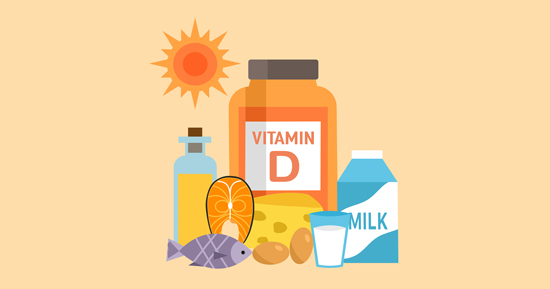Top 10 Natural Ways to Increase Vitamin D in Your Diet!

Often referred to as the “sunshine vitamin,” vitamin D is essential for preserving general health. In reaction to sunshine, vitamin D is created in the skin and can be acquired through specific foods and supplements. This necessary nutrient has many advantages and is crucial for the immune system and bone health. Sadly, many individuals lack enough vitamin D, which can cause a number of health problems.
This article, guided by insights from the best nutritionist in Mumbai, will explore vitamin D, its benefits, the consequences of deficiency, and the top 10 natural ways to increase vitamin D in your diet.
What is Vitamin D?
There are two primary forms of vitamin D, which are fat-soluble: vitamin D2 (ergocalciferol) and vitamin D3 (cholecalciferol). Animal-based meals also contain D3, produced by the skin when exposed to sunshine, in contrast to some plant-based diets and fortified goods containing D2.
Benefits of Vitamin D
Vitamin D offers numerous health benefits, including:
- Bone Health: Vitamin D is vital for calcium absorption and maintaining strong and healthy bones. It helps prevent conditions like rickets in children and osteoporosis in adults.
- Immune System Support: Vitamin D reduces inflammation and boosts the ability of monocytes and macrophages, two crucial components of your immune system, to combat pathogens.
- Mood Regulation: Vitamin D plays a role in regulating mood and warding off depression. Research has shown a connection between low levels of vitamin D and an increased risk of depression.
- Heart Health: Adequate vitamin D levels can help reduce cardiovascular disease risk by maintaining blood pressure and improving heart function.
- Weight Management: Some studies suggest that vitamin D can help regulate appetite and increase fat breakdown, assisting in weight management.
Consequences of Vitamin D Deficiency
A deficiency in vitamin D can cause a variety of health issues, such as:
- Bone Disorders: Vitamin D deficiency can cause brittle bones, which raises the risk of fractures and diseases, including rickets and osteoporosis.
- Weakened Immune System: The immune system weakens by low vitamin D levels, leaving the body more vulnerable to illnesses and infections.
- Depression and Mood Swings: A deficiency in vitamin D causes an increased risk of mood disorders, including depression.
- Muscle Weakness: Vitamin D deficiency causes muscle weakness, pain, and an increased risk of falls, particularly in older adults.
- Chronic Diseases: Prolonged insufficiency of vitamin D has been associated with persistent ailments like diabetes, heart disease, and several types of cancer.
Top 10 Natural Ways to Increase Vitamin D in Your Diet
According to the best nutritionist in Mumbai, here are the top 10 natural ways to speed up your vitamin D levels:
-
Sunlight Exposure
Regular exposure to sunlight is the best natural way to increase your vitamin D levels. Aim for at least 10-30 minutes of midday sun several times weekly, depending on your skin sensitivity and geographic location. Expose your face, arms, and legs to maximize vitamin D production.
-
Fatty Fish
Fatty fish like salmon, mackerel, tuna, and sardines are rich sources of vitamin D. Including these fish in your diet a few times a week can significantly boost your vitamin D intake. Wild-caught varieties generally have higher levels of vitamin D compared to farmed fish.
-
Cod Liver Oil
For people who don’t eat fish, cod liver oil is a decent substitute because it is high in vitamin D. Together with other healthy nutrients like omega-3 fatty acids and vitamin A, a spoonful of cod liver oil can supply more vitamin D than is advised daily.
-
Egg Yolks
Egg yolks contain vitamin D, although the amount can vary depending on the chicken’s diet. Free-range or pasture-raised chickens tend to have higher vitamin D levels in their eggs. Incorporate whole eggs into your diet to take advantage of this natural source.
-
Mushrooms
Some mushrooms, including maitake and shiitake, are special plant sources of vitamin D. When exposed to sunlight or UV light, these mushrooms can synthesize vitamin D2. Including sun-dried mushrooms in your meals can help boost your vitamin D levels.
-
Fortified Foods
Many foods contain vitamin D, including milk, orange juice, cereals, and plant-based alternatives like almond, soy, and oat milk. Check the labels to ensure these products are fortified, and include them in your diet.
-
Cheese
Some cheeses, particularly ricotta and Swiss cheese, contain small amounts of vitamin D. Including these in your diet can increase your overall vitamin D consumption, even if it’s not a major source.
-
Beef Liver
Beef liver is a nutrient-dense organ meat that provides a good amount of vitamin D along with other essential vitamins and minerals. Consuming beef liver in moderation can help increase your vitamin D levels naturally.
-
Yogurt
Some yogurts have added vitamin D fortification. Incorporating fortified yogurt into your diet may allow you to get the benefits of probiotics and calcium while increasing your vitamin D consumption. It’s simple and delicious.
-
Oysters
Some yogurts have added vitamin D fortification. Incorporating fortified yogurt into your diet may allow you to get the benefits of probiotics and calcium while increasing your vitamin D consumption. It’s simple and delicious.
Maintaining adequate vitamin D levels is crucial for overall health and well-being.
The best nutritionist in Mumbai emphasizes the importance of incorporating natural sources of vitamin D into your diet to avoid the negative health impacts of deficiency. By following the top 10 natural ways outlined above, you can effectively boost your vitamin D levels and enjoy this essential nutrient’s numerous benefits. Always consult a qualified nutritionist to tailor your vitamin D intake to your needs and circumstances.
Ensuring you get enough vitamin D through sunlight exposure, dietary sources, and fortified foods can help you maintain strong bones, a robust immune system, and overall good health. Take proactive steps to monitor and manage your vitamin D levels, and enjoy the vitality and well-being that come with optimal nutrition.











